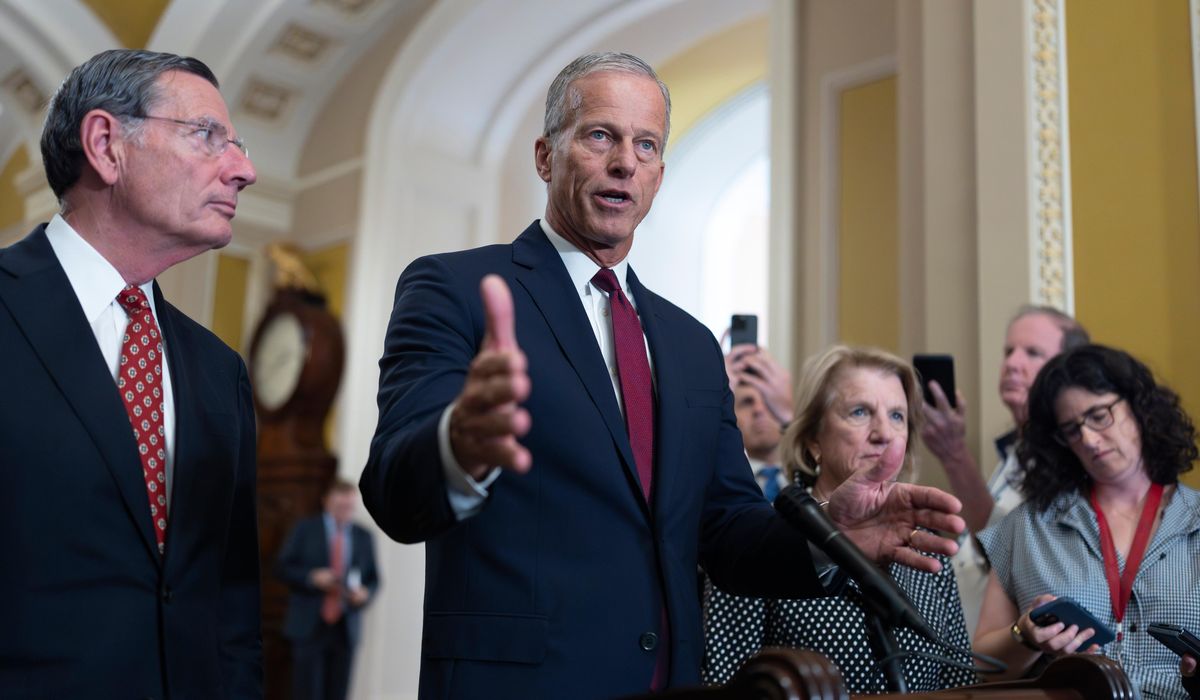


Senate Republicans, frustrated with Democrats’ refusal to fast-track any of President Trump’s nominees, are considering last-ditch options for ending the blockade, including changing the chamber’s rules or allowing recess appointments.
Their first choice is to cut a deal with Democrats to advance some of the growing backlog of nominations by voice vote or unanimous consent.
Such fast-track deals have been made for batches of nominees with bipartisan support in prior administrations, but Democrats have refused to do so for any of Mr. Trump’s second-term nominees outside of military promotions.
“We have never seen in history anything like what the Democrats are now doing,” said Senate Majority Leader John Thune. “As of this date, back in 2021, Joe Biden had gotten 46 nominees confirmed by voice vote or unanimous consent. Donald Trump has zero.
“It’s Trump derangement syndrome on steroids,” the South Dakota Republican said.
Democrats also put up obstacles during Mr. Trump’s first term, but he had five civilian nominees confirmed via voice vote by July 29, 2017. Even the 46 confirmed via voice vote by that date during President Biden’s first year lags compared to previous administrations — 209 nominees confirmed via voice vote by that time in the Obama administration and 192 in the George W. Bush administration.
The Senate is scheduled to begin its summer break at the end of the week, but Republicans have said they may need to extend the session to confirm more of Mr. Trump’s nominees.
Mr. Thune said he is hoping Democrats will change course in the coming days and agree to fast-track a package of nominations, rather than make the Senate run through procedural hurdles on every nominee.
If they don’t, he said, they’re just setting a bad precedent that Republicans can exploit the next time a Democrat is in the White House.
“What goes around comes around,” Mr. Thune said.
Senate Democrats are still discussing their options, but it would take every senator to agree to a unanimous consent deal to speed up any confirmation, let alone a batch of them.
Sen. Chris Murphy, Connecticut Democrat, said the concessions senators would seek would vary by individual and their priorities.
“It’s just impossible to know,” he said, but provided potential examples: “If the administration commits in writing to start spending all the money to restore all the federal employees they fired, to give the jet back to Qatar.”
Senate Minority Leader Charles E. Schumer, New York Democrat, has notably avoided mentioning the nominations process in his public remarks so far this week, and his office did not respond to a request for comment.
As of Tuesday, there were 152 civilian nominees reported out of committee and awaiting a floor vote.
For months, Mr. Thune has just been focused on “grinding it out,” as he’s repeatedly referred to the process of running each nomination through Senate hurdles. But on Tuesday, Senate Republicans discussed taking more drastic measures to push Mr. Trump’s nominees through.
One option is allowing Mr. Trump to bypass the Senate and make recess appointments, which would require Congress to pass a concurrent resolution allowing the chambers to adjourn for more than three days. The Supreme Court has said Congress must adjourn for at least 10 days for a president to make recess appointments.
The House left Washington for its summer break without voting on an adjournment resolution, so the chamber would have to come back into session if the Senate decided to pursue this option.
Another option Republicans discussed is unilaterally changing the Senate rules to speed up the process for considering nominations. This is considered the “nuclear option” because it would involve Republicans overriding the normal three-fifths vote required for changing Senate rules.
Democrats deployed the nuclear option in 2013 to reduce the threshold for confirming most nominees from 60 votes to a simple majority. In 2017, Republicans went nuclear in extending that rule to Supreme Court nominees. And in 2019, Republicans used the nuclear option again to cut debate time on executive and judicial nominations.
Sen. Mike Rounds, South Dakota Republican, said his party is “trying to avoid” the nuclear option but can’t rule it out given the unprecedented level of Democratic obstruction.
“None of us like that,” he said. “But at some point, you’ve got to have an operational government.”
• Lindsey McPherson can be reached at lmcpherson@washingtontimes.com.
